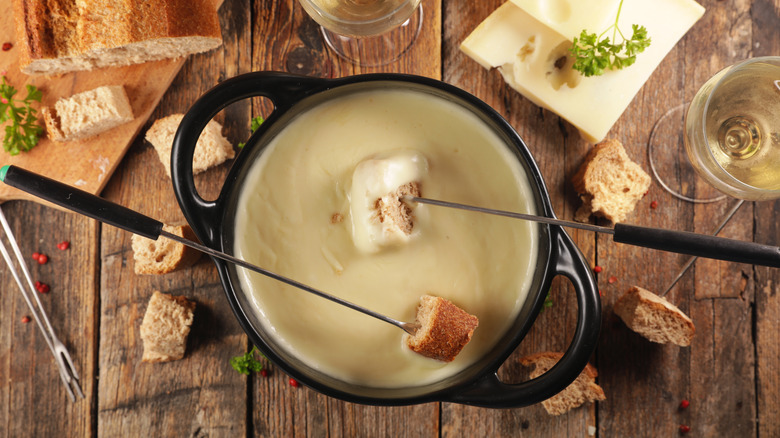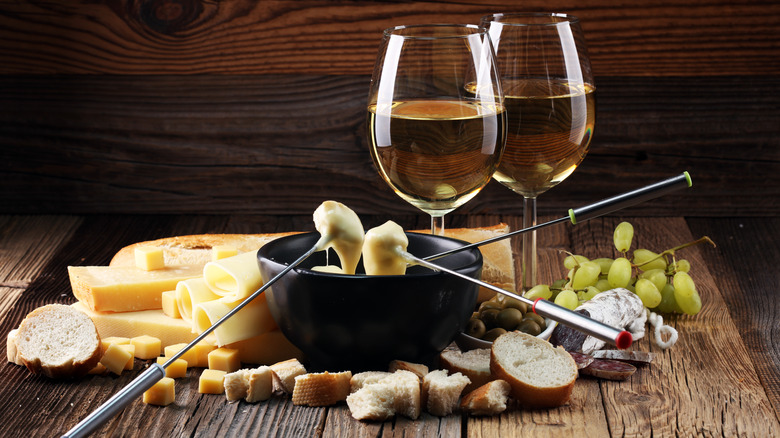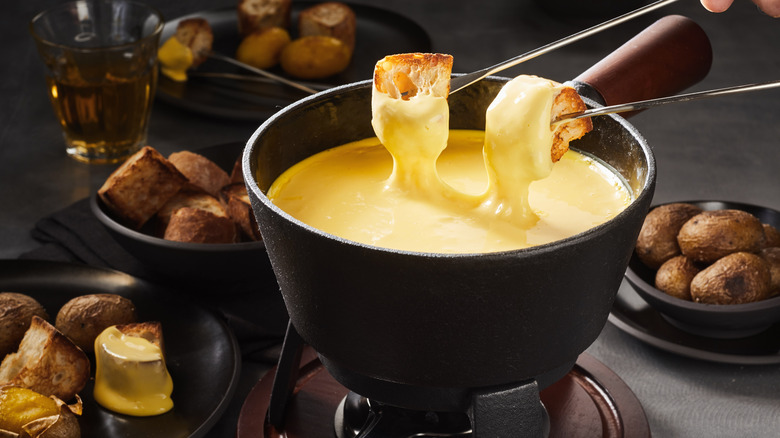Why You're Not Supposed To Drink Water With Traditional Fondue
Several elements define a good fondue: The choice of cheese is the most vital part, without a doubt, as are the seasonings, aromatics, and splashes of wine that flavor it. Then there's the matter of accompaniments — breads, meats, vegetables, and even fruits to mop up the cheese. But there is another element of utmost importance in a traditional Swiss fondue: the beverage that is served alongside it. In Switzerland, a traditional fondue may be served with a variety of drinks, but what you'll almost never find on the table is a glass of water. Far from being a matter of taste, the noticeable absence of water has more to do with the distressing effects on the stomach.
Eating large quantities of dairy — like those in large fondue pots filled to the brim with thick, gently bubbling, melted cheese — may be a treat for the tongue, but for many, it has not-so-favorable effects on the digestive system. Because cheese is full of fat and lacks fiber, eating too much of it can slow down the process of digestion, causing bloating, if not constipation. And sipping on water between bites of fondue — according to Swiss lore — has the potential to make things worse, as it can cause the stringy liquid to clot into a ball in your stomach, preventing it from digesting the cheese properly. The same goes for juice, beer, and even soda — gulping these while dipping into a fondue is a potential one-way ticket to tummy troubles the next morning.
Traditional fondues favor alcohol
Fondues tend to make you thirsty for a refreshing beverage to cut through all that rich cheese, but traditional versions swap water and carbonated beverages for a variety of alcoholic drinks instead. Wine is a big favorite, especially white wine, whose acidic nature helps stimulate digestion. Dry white wines like riesling are popular, as is room-temperature Fendant, a sparkling white wine made from Chasselas grapes.
Traditional fondues are often followed by a shot-sized serving of kirsch as well — an eau de vie, or colorless fruit brandy, made from sour Morello cherries, also known as cherry schnapps. A quick swig of kirsch is believed to whet the appetite just enough to polish off the exquisite la religieuse, also known as the crusty cheese stuck to the bottom of the fondue pot. Those who don't mind the extra kick of alcohol might also dunk their bread in a glass of kirsch before taking it to the fondue pot, for a one-two punch of bitter booze and warm cheese. Although cocktails aren't common on a Swiss dinner table with traditional fondues, strong, alcohol-forward tipples like martinis do make for fabulous accompaniments too.
Black tea may have an edge over alcohol
Alcohol aside, tea is another popular drink often sipped with fondues. While herbal teas are the most traditional choice, a 2010 study published in the "British Medical Journal" compared the effects of drinking black tea versus white wine followed by a shot of kirsch or cherry schnapps on participants as they ate Swiss fondue. The research found that gastric emptying — the rate at which food moves from the stomach to the small intestine — took considerably longer with alcohol (white wine and schnapps) than with black tea.
In layman's terms, the feeling of bloated fullness that often comes after devouring a rich pot of cheese fondue lingered for longer when it was eaten alongside alcohol. "If that is a problem for you," said the study's researcher Dr. Mark Fox in a YouTube video, "then almost certainly you should be drinking tea with your fondue."
That said, for those unconcerned with the length of the digestive process, it appears that white wine, Kirsch, and various teas are all equally Swiss-approved beverages to enjoy with fondue.



